Ajouter une intrigue dans votre langueA singer marries a famous composer, and after a while she gets the itch to go back on the stage. However, her husband won't let her. When she hears that a popular French singer named "Raquel... Tout lireA singer marries a famous composer, and after a while she gets the itch to go back on the stage. However, her husband won't let her. When she hears that a popular French singer named "Raquel" is coming to New York, she decides to go to Raquel with a plan--unbeknownst to her husba... Tout lireA singer marries a famous composer, and after a while she gets the itch to go back on the stage. However, her husband won't let her. When she hears that a popular French singer named "Raquel" is coming to New York, she decides to go to Raquel with a plan--unbeknownst to her husband, "Raquel" is actually her sister, and her plan is for them to switch places so she can ... Tout lire
- Prix
- 3 victoires au total
- Sculptor
- (scenes deleted)
- Show Girl
- (uncredited)
- Show Girl
- (uncredited)
Avis en vedette
When the film begins, you learn that Helen (Bennett) loves her husband, Douglas (Tone), but longs to go back on stage. Some time ago, she was the other half of an act...but he insists (like most men of his day) that she stay home and be his dutiful wife. But she decides to play a trick on him when she learns her old partner Raquel (also Bennett) is coming to America. As the two are identical strangers and equally talented, she asks Raquel to let her pretend to be her to see how Douglas reacts. Naturally, she is a perfect duplicate for Raquel in every way and she's a success...but it also appears as if Douglas is ready to now dump his wife for Raquel!
The film's success all depends on the audience's ability to accept a very bad (in my opinion) cliché--the identical stranger. Shows like "I Dream of Jeanie", "Bewitched" and "The Patty Duke Show" all devoted much of their content to this sort of plot device...and in many ways the film comes off more like a bad 60s sitcom than a movie someone would actually pay to see. Additionally, way too much uninteresting music made this one a chore to finish. Not among the actors' best work, that's for sure.
It's one of the few musicals that Zanuck's 20th Century Productions turned out before the merger with Fox, and as usual, no expense was spared. Warren & Dubin provided three songs, including "Boulevard of Broken dreams"; Russell Markert did the choreography; and Russ Columbo and the Bosworth sisters perform. Helen Westley gets most of the good lines in a script written by Nunnally Johnson and Henry Lehrman, and director Sidney Lanfield offers a sprightly opening, with the set-up being explained while acrobats audition or the show. The story, of course, is trivial, the old chestnut about spouses in disguise seducing each other. But the excellence of the production makes it watchable throughout.
Though the narrative is relatively common, the screenplay is nonetheless filled with cleverness and good humor to let this telling stand by itself. The specific scenario (show business!) and the characters are a joy, lent power by the musical flavors; the dialogue and scene writing is sharp and witty across the board, even as they dally with recognizable strains of gender dynamics and romance. The cast are clearly having a blast with the silliness, inhabiting their roles with spirit, vitality, and warmth, and it's hard to pick a favorite between Constance Bennett, Franchot Tone, and Tullio Carmineti. Their co-stars in supporting parts are just as splendid, though, including Helen Westley as put-upon Mrs. Morris. I rather think the writers and the actors evenly split credit for the lion's share of the film's value, for both contribute their own brilliant sparks to what 'Moulin Rouge' represents. As such, even a running side gag that in another title might quickly wear thin (interactions between Le Maire and a belligerent drunk) instead only adds to the frivolity.
This is hardly to discount the hard work of all others involved. The costume design and hair and makeup are lovely; the production design and art direction are very well done and quite fetching, surely almost as grand as anything we'd expect in like works. Both these facets are surely bolstered by the musical sequences that are a minor joy, with kitschy but welcome variety, and the sheer number of extras on hand. And kudos to director Sidney Lanfield for ably tying together all these moving parts; his orchestration of each scene somewhat seems to me to defer to the strength of the writing and the acting, only loosely and mindfully further shaping what already has found its own terrific form.
Highly enjoyable as it is, there's nothing about this that completely leaps out as a singular stroke of genius. For that matter, for any modern viewers who have difficulty engaging with older cinema, there's not necessarily anything here to change one's mind. Then again, there's no rule that says every movie of any esteem needs to be lightning in a bottle. Personal preferences vary. All I know is that I sat down hoping to have a good time, and 'Moulin Rouge' provided just that. It's lighthearted merriment that's well made, with fine writing and acting; what else should it be? Don't feel like you need to go out of your way for it, but if you have a chance to check it out, this is well deserving of a mere 70 minutes.
Competently done, though Constance Bennett's singing sounded better with her 'French' accent (perhaps the sound in the first reel got distorted). There is a grand finale of about 15 minutes that has most of the singing and dancing, which is typical for movies for the time. Some of the gags are good and some of the women's costumes are great.
Unrelated to other moves of the same name.
Ms Bennett actually supported Garbo a few years later in 'Two-Faced Woman' (1941), yet another version of this particular tale...
Le saviez-vous
- AnecdotesThe film's songs were penned by Harry Warren and Al Dubin on the heels of their prolific, back-to-back scores for 42nd Street, Gold Diggers of 1933 and Footlight Parade, all produced in 1933. Under contract to Warner Bros., this film was one of only two loan-outs for the team. The other was Roman Scandals (1933) for producer Samuel Goldwyn.
- GaffesRaquel signs in at the hotel as Mlle. (Mademoiselle). But the clerk addresses her as Madame.
- Citations
Douglas Hall: Vicky, never marry a woman whose had any connection with the stage no matter how much you love her.
- ConnexionsFeatured in The Voice That Thrilled the World (1943)
- Bandes originalesThe Boulevard of Broken Dreams
(uncredited)
Music by Harry Warren
Lyrics by Al Dubin
Performed by Constance Bennett in rehearsal
Reprised by Constance Bennett and chorus in the show finale
Meilleurs choix
- How long is Moulin Rouge?Propulsé par Alexa
Détails
- Durée1 heure 10 minutes
- Couleur
- Rapport de forme
- 1.37 : 1
Contribuer à cette page







































